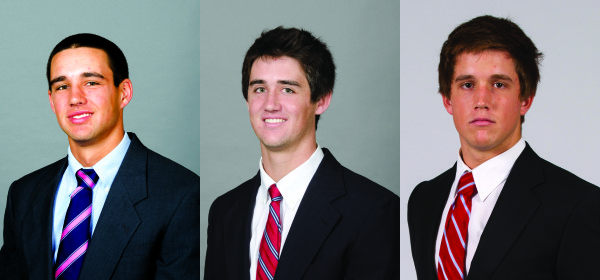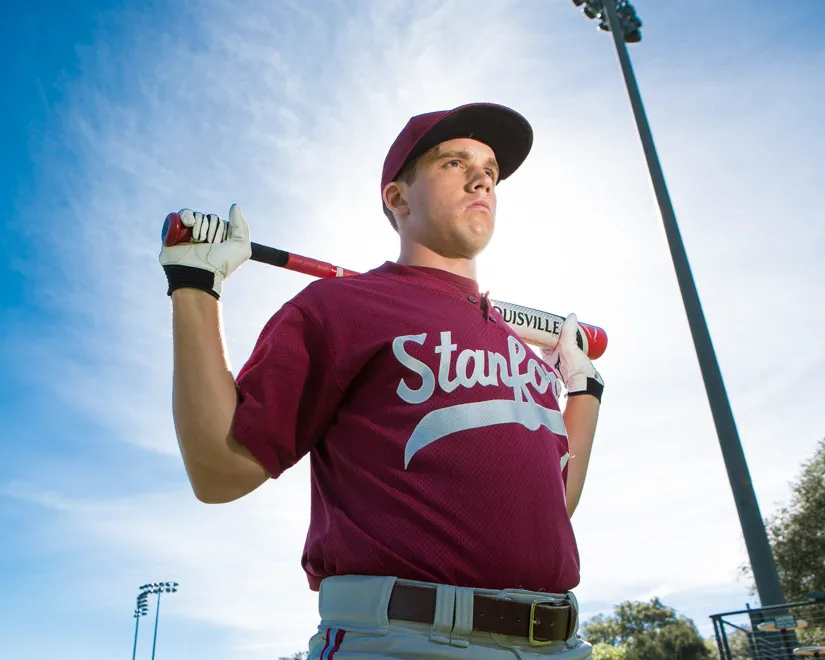If you’ve been to any Stanford baseball game over the last five years, chances are that you recognize the name Diekroeger. After all, the Cardinal have played 217 consecutive games with a player bearing that last name in their lineup.
Both parents of the Diekroeger family, Ken and Kathy, have degrees from Stanford and they make their home in Woodside, just a stone’s throw from campus. All three sons have continued that tradition, arriving on the Farm by way of The Menlo School, just a couple of miles north of El Camino.
The oldest brother, Kenny, took the Farm by storm in 2010, earning All-America honors after his freshman season. Danny, the middle brother, joined him one year later. Before long, the two formed a double-play combination: Kenny at shortstop and Danny at second base. This season, the Diekroeger legacy lives on, as the youngest brother, Mikey, has arrived at Sunken Diamond and has been embroiled in a battle for the starting third baseman job.
The Daily sat down with Mikey Diekroeger to speak about growing up with two older brothers and his family’s mark on Stanford baseball.
The Stanford Daily (TSD): Living less than 20 minutes away, what was your connection to Stanford like growing up?
Mikey Diekroeger (MD): Stanford baseball — the games, the camps over the summer — Stanford football games, basketball games: We were always coming here no matter which season it was. I would come here with my dad and my whole family. I’ve always been connected to Stanford, even closer in the last five years with my brothers being here, going to the games even more and visiting them.
TSD: So did the three of you always have your sights set on attending Stanford while you were growing up?
MD: Initially, Kenny’s goal was to just play college baseball somewhere. He was recruited by some other schools, and then luckily, his sophomore year, he started getting recruited by Stanford. He always wanted to go there but baseball wasn’t an option initially. Once he got recruited, then there was a thought that Danny would be too. And once Danny did, it was kind of expected that I would come too.
TSD: What was it like within your family as Kenny and Danny started being recruited, and you were just finishing up middle school and starting high school?
MD: Kenny committing his junior year was a huge event, a huge accomplishment. For anyone it is, but it was cool just to see it happen and know that he was going to play college baseball. Danny was deciding between whether he wanted to play football or baseball in college, and Stanford was really a last resort. He decided really late, the summer between his junior and senior years when he was playing football.
I still remember watching my brothers’ first games and my parents being nervous all the time — they got better with it. They were always excited about going to the games and they never took it for granted. I’m pretty sure my dad missed like two games in the last two years — home and away.

With me, I guess it was more expected than it was for Kenny. Especially as an eighth grader or a freshman, it wasn’t expected that he’d go to Stanford. But since they had already done it, when my turn came, it was a thought in a lot of people’s heads and that was my goal at the time. That was always why I wanted to follow in their footsteps no matter what. They were proud of me, and my parents were too, but it was the third time. So they were only that excited.
TSD: How different was your parents’ reaction to your commitment to Stanford as opposed to Kenny’s and Danny’s?
MD: When I got in, there was a “congrats”; it wasn’t much more than that. There was no event or signing; it was kind of just low-key. It’s sad to say, but it wasn’t anything major.
It’s fine. I laugh at it because I’m definitely blessed to have them go through it. Without them, coaches wouldn’t have known who I was and they wouldn’t have wanted to come watch me. So it’s a trade-off for my parents not being as excited.
TSD: When you were playing in high school, and when Kenny and Danny were playing at Stanford, did your parents have to make any tough decisions about whose games to go to?
MD: Yeah, there was one time where I actually had the championship — basically as far as we could go for high school. And Stanford also had some regular season game.
My dad showed up to that one and showed up mid-game to my game. I don’t blame them because at the time, they were playing short and second. I always told them that too. I told them, “Go to their games first, and then think about going to mine. You don’t ever know if they’re going to still be in the lineup. You can watch me next year.” It was especially true with Kenny going off to minor league baseball, and then Danny two years later.
TSD: What was it like growing up with two older brothers in the house?
MD: It’s definitely helped me out in a lot of ways. To be the youngest, there are a lot of benefits. You get to see the right way to do things; you get to see how they mess up or how they do things well.
They paved the way and gave me an example of what to go off because they literally went though exactly what I did. And they always make sure to tell me that too. When they give me advice, they make sure to note that they’d been through exactly the same thing and they know what it’s like.
TSD: Was there any ever competition between you guys, especially with sports playing such a large role in your childhoods?
MD: There was a time when we were playing basketball with a mini-hoop in our room upstairs. Danny was playing against me and I was playing defense against the wall. He backed me down to the hoop as he was driving to the basket. And I was short, so I hit my head on the doorknob really hard and I started crying and running downstairs for my mom. There’s a whole video of it: My mom saying, “Alright, you need to stop.” And it was just funny because my brother ran the entire way down, laughing the entire time.
TSD: All three of you guys are infielders, and versatile ones at that. How did that work out? Did you guys field grounders with each other? Did your dad go out and hit grounders to all of you? Did that make it any easier? Would you guys practice at the same time?
MD: Now that I think about it, that may have been why. We would just go on the infield and practice. My dad would throw the ball up and hit it, never really trying to do pop-ups. Just ground balls — that’s probably why.
TSD: Moving forward, as you fight for a spot in the starting lineup and start your Stanford baseball career, how much pressure do you feel to forge your own path? Do you feel that you’re living in the shadows of your brothers?
MD: Yeah, definitely. I do feel like I’m living in their shadows. But at the same time, I also have the opportunity to make a name and do something for myself — have a career, try my best in baseball and school and come out of here with the best possible situation.
I definitely do feel that I live in their shadow and people know me because of them, but I’m blessed to have the opportunity to be here and continue a tradition.
Contact Jordan Wallach at jwallach ‘at’ stanford.edu.
